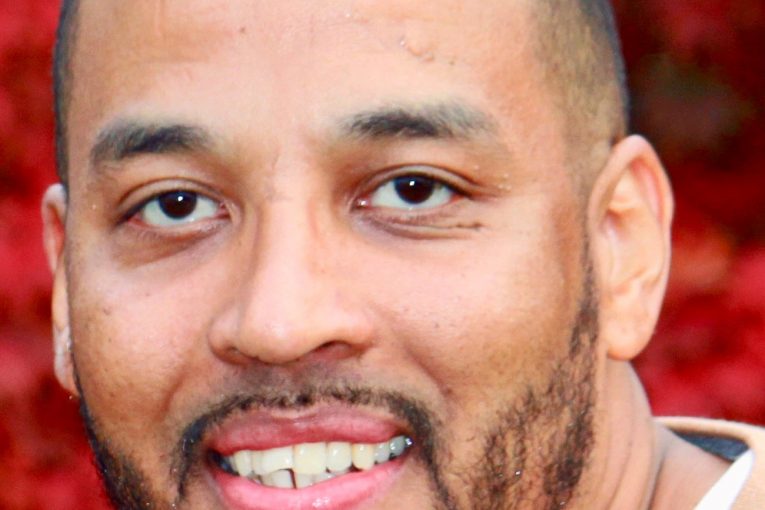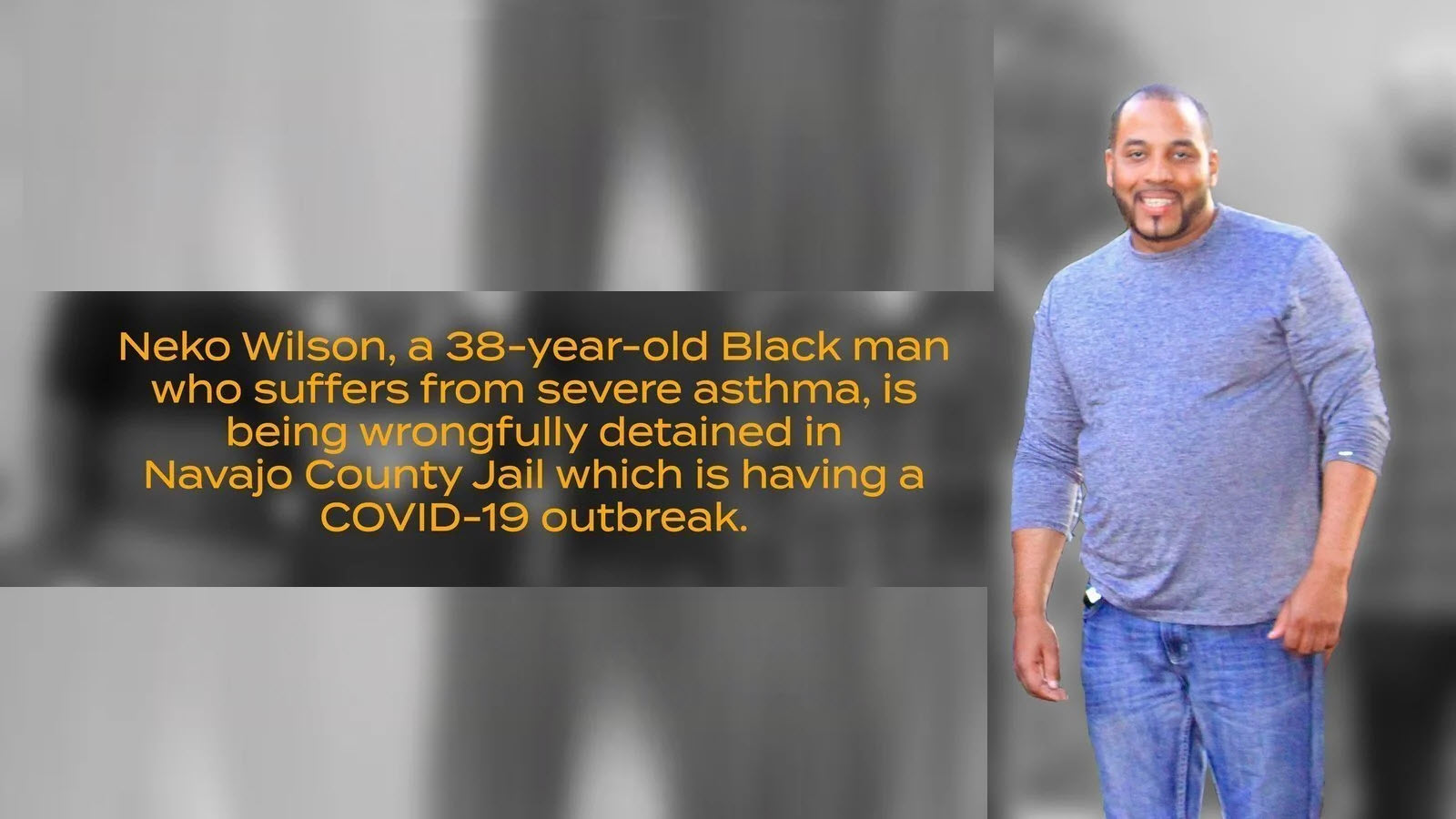

By Layla Mustafa
PHOENIX – The Arizona Supreme Court was presented with an Oral Argument this Tuesday regarding a finding made by the Court of Appeals. The argument questioned the court’s decision on the special action petition of defendant Neko Anthony Wilson.
Neko Wilson was convicted of illegal possession of marijuana during a stop, search and seizure in 2006. After three years of probation, he was arrested for and pled guilty to two counts of robbery in California, resulting in a nine-year sentence. Following this arrest in California, Navajo County filed a petition to revoke probation and issue a warrant for his arrest.
The warrant was issued by Judge Robert J. Higgins, who implied his hands were tied by Arizona Rule 7.2 (c) which mandated that Wilson be held without bail.
Wilson, however, has now been held in custody for the past 15 months without bail or a bail hearing. After multiple failed attempts to file petitions or motions for release due to the pandemic, he was finally able to gain some traction after filing a petition for special action to the Court of Appeals.
In this special action petition, Wilson contended that Rule 7.2(c) was inapplicable under the current version of Rule 27.7(c) which had been amended by the Arizona Supreme Court on January 1, 2018.
The Rule 27.7(c) stated prior to its modification: “At the initial appearance, the court must advise the probationer of the probationer’s right to counsel under Rule 27.6, inform the probationer that any statement the probationer makes before the hearing may be used against the probationer, set the date of the revocation arraignment, and make a release determination under Rule 7.2(c).”  However, on January 1st, 2018 the task force removed the line: “under Rule 7.2(c).”
However, on January 1st, 2018 the task force removed the line: “under Rule 7.2(c).”
The Court of Appeals found Wilson’s contention to carry some weight. They came to the conclusion that, “When language from a rule is deleted, we infer that it was done purposefully, to make clear that the omitted phrase no longer has any effect.” (para. 14) Additionally, they assert that the decision to remove the reference was “sensible” given that Rule 7.2(c) refers to the release of a convicted defendant, while Rule 27.7(c) refers to the release of a probationer awaiting a hearing on a petition to revoke probation.
Wilson is a probationer who is facing a petition to revoke his charges for violation of probation but has not yet been convicted of the alleged violation. In consideration with this fact, the court found that Wilson’s case therefore would not be applicable to Rule 7.2(c) which pertains to a defendant convicted of an offense that has resulted in his or her detention.
They also acknowledged that any post-trial motion on Wilson’s 2006 conviction has been effectively time-barred as the exceptions to rule 7.2(c)(1)(a)(i) have no application to his situation. The court determined “when a probationer is arrested on a petition to revoke probation, Rule 7.2(c) has no application to the superior court’s determination of release conditions under Rule 27.7(c).” (para. 17)
Tuesday’s proceedings only illustrated another obstacle in Wilson’s path towards a bail-hearing.
During the Oral Argument case, Deputy Attorney Michael Shumway argued that the Court of Appeals erred in ignoring 7.2(c)’s plain language and asked the court to consider reversing the Court of Appeals’ petition decision – and to affirm the trial court’s decisions.
Shumway made his case by repeatedly calling on the “45 years of history in applying this framework” referring to the use of 7.2(c) in past probation cases. Shumway argued that application of the  rules in the new manner indicated by the Court of Appeals would effectively make a “substantive change” to the rule. Shumway argued that the intent of the task force in editing 27.7(c) was to apply mostly “aesthetic changes,” rather than make substantive changes.
rules in the new manner indicated by the Court of Appeals would effectively make a “substantive change” to the rule. Shumway argued that the intent of the task force in editing 27.7(c) was to apply mostly “aesthetic changes,” rather than make substantive changes.
Judge Andrew Gould, referring to the right for some form of due process under 27.6 and 27.7, asked -“Isn’t one of the reasons why you don’t have a preliminary hearing in a violation of probation case, because you are due for a hearing within 7-20 days?”
Shumway only replied, “that could be so.” Shumway answered many of the following questions by continuously stressing the significance of the “history” of applying the rule’s framework as a testament to how it should currently be used.
7.2(c) indicates that one may be held without bail if the court has “probable cause to believe that the offense was committed and that the defendant has committed it.” (7.2(c)). Shumway emphasized that the combination of 7.2(c)’s plain language, along with its history of use, shows the courts naturally imply their belief on probable cause depending on whether or not they hold the defendant pursuant to 7.2(c).
Shumway claimed Judge Higgins found it likely that Wilson would be sentenced to prison, which explains why Wilson was held pursuant to 7.2(c).
Judge Bill Montgomery speculated that in following Shumway’s interpretation of 7.2(c) whether it would be necessary for some written assurance by trial courts. Montgomery inquired whether it would be necessary that after every conviction trial courts be required to record their findings on whether or not the court believes the defendant does or doesn’t deserve a sentence of imprisonment.
Shumway argued that while recording a court’s finding on a defendant’s probable cause for imprisonment would be “good practice” there is no need for it to be required. He reasserted that when a trial judge makes a finding – holding a defendant pursuant to 7.2(c) or not – their finding on the probable cause of the offense is naturally implicit in the 7.2(c) ruling.
He concluded that this implicitness should be trusted because we must “presume trial judges know and follow the law.”
In the following oral argument made by Lee Phillips on behalf of Wilson, Phillips began by restating the length of time in which Wilson has been held in custody without bail pursuant to the order made by Judge Higgins.
Phillips argued that through the deletion of reference to 7.2(c), the rule was intentionally changed. Phillips claimed that the task force made a conscious decision to delete the reference to rule 7.2(c) from 27.7(c) because they understood it did not apply. Phillips emphasized that the Court of Appeals decision was made in an attempt to clarify and simplify the rule change.
Judge Gould was unyielding in his questioning of Phillips over the explicit intent of the task force to substantively change the rule, which was mentioned in Shumway’s argument. At one point during the proceeding Gould inquired, “Where was their intent to change the rule regarding release condition when they took that reference to 7.2(c) out?”
Phillips agreed that while the task force did not provide that specific language in the rule change, he contended once again that the explicit deletion of the reference indicated their intent to change the rule.
Finally, some discussion arose regarding whether or not the defendant was currently facing a pre- or post-conviction violation. Phillips argued that the state’s language on conviction does not apply to probation situations as there is no conviction only a finding
Judge Gould however, expressed that Wilson was in a post-conviction status when on probation. Therefore, to treat alleged violations as pre-convictions is not necessarily applicable. Gould specified that even if one is accused of the alleged violations at a violation of probation hearing you would not be convicted, but instead found as a violation of condition.
Gould questioned “Why would you treat somebody on probation in a release situation as a pre-conviction defendant when they are post-conviction?”
Phillips argued Wilson’s “post-conviction” Judge Gould referred to would be from the 2006 marijuana offense. However, Wilson had already been sentenced for that offense. The current allegations which Wilson is being held on assert that he violated probation. These allegations – which have not yet been proven, show that Wilson is being held in Arizona pre-conviction and pre-trial.
According to Phillips – since Wilson has not yet been given due process to present his evidence to the court on the allegations made that he violated probation – he has in essence not yet been “convicted.”
Phillips finally requested that the court not further rewrite or change this rule that both the court and task force agreed on in 2018.
If Wilson is able to receive a bail hearing because of the 2018 changes made to Rule 27.7(c), this could have major implications for bail in probation cases across the state. This affirmation would mean judges and prosecutors alike would be held to granting probationers their hearing in due process.
If confirmed that 7.2(c) does indeed not pertain to probationers, and that there was clear intent in the deletion of the reference to 7.2(c) in 27.7(c), there would be an effective change to the setting of no bail on Arizonan probation cases.
To sign up for our new newsletter – Everyday Injustice – https://tinyurl.com/yyultcf9
Support our work – to become a sustaining at $5 – $10- $25 per month hit the link:




